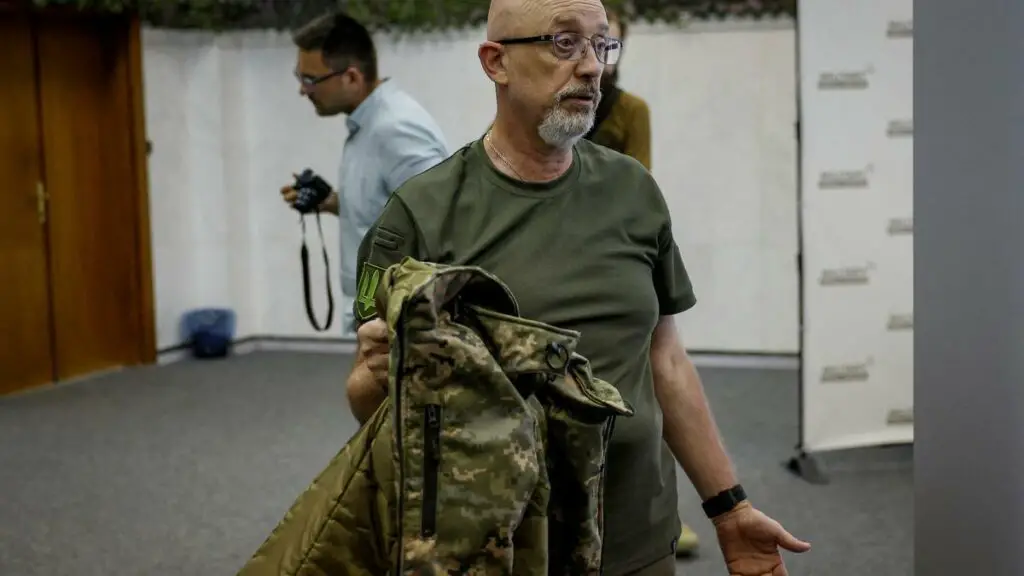In a significant turn of events, Ukrainian President Volodymyr Zelenskyy declared the departure of defense minister Oleksiy Reznikov on Sunday. This decision comes amidst the ongoing Russia-Ukraine conflict that has spanned a year and a half. Zelenskyy’s announcement arrives on the heels of a thwarted attack by Russian drones in the southern Odesa region, targeting a Danube port near the border with NATO member Romania.
Zelenskyy expressed his reasoning, stating, “Oleksiy Reznikov has endured more than 550 days of full-scale war.” He emphasized the need for new approaches and innovative interactions between the military and society, suggesting a shift in the ministry’s leadership to better address the evolving challenges.
Rustem Umerov, a Crimean Tatar, was nominated by Zelenskyy to succeed Reznikov. Umerov, who currently leads the State Property Fund, awaits approval from Ukraine’s parliament.
The timing of Reznikov’s removal coincides with Kyiv’s counteroffensive efforts and Ukraine’s broader fight against corruption in response to European Union appeals. Russia continues to wage its military campaign, targeting Ukraine’s infrastructure. The termination of a crucial grain deal has propelled Russia to launch attacks on strategic points in the Black Sea and the Danube river.
Curiously, the recent assault came on the eve of a summit in Russia involving President Vladimir Putin and Turkish leader Recep Tayyip Erdogan. The latter aims to rejuvenate the grain agreement, emphasizing its economic importance.
Reports reveal that Russia deployed Iranian-made Shahed drones in its attack on the Odesa region. Disturbingly, some of these drones struck the Danube area, resulting in injuries and damage to civilian-industrial infrastructure.
Notably, Russia targeted “fuel storage” facilities in Reni, a Ukrainian port on the Danube river. Reni, positioned close to Romania and Moldova, serves as a vital transport hub for sea and river routes.
The Romanian defense ministry condemned the attacks, emphasizing their violation of international humanitarian law. While not posing a direct threat to Romanian territory, the attacks were deemed incompatible with established norms.
Moldovan President Maia Sandu also expressed condemnation, characterizing the attack as “brutal.”
Meanwhile, Kyiv reported progress in its counter-offensive efforts on the southern front. The recapture of the village of Robotyne was hailed as a strategic victory, potentially paving the way for Ukrainian forces to advance toward Moscow-annexed Crimea.
General Oleksandr Tarnavskiy, leading the southern counteroffensive, highlighted Kyiv’s achievements. Tarnavskiy mentioned breaching Russian lines near Zaporizhzhia, marking an essential breakthrough. Despite challenges posed by heavily mined territory, Ukrainian troops successfully navigated through, making significant advancements.
Acknowledging the losses incurred, Tarnavskiy noted the strength and dedication of Ukrainian soldiers. While Russia has not officially announced another mobilization, it has actively sought to bolster its military ranks throughout the Ukraine offensive.
Former President Dmitry Medvedev revealed that Russia enlisted 230,000 individuals into its armed forces since the start of the year. This recruitment drive aimed to reinforce the army’s capabilities amid the ongoing conflict.
As the conflict rages on, it becomes evident that both sides are engaged in a complex struggle, marked by strategic maneuvers, territorial gains, and diplomatic negotiations. The geopolitical implications of this conflict extend far beyond the borders of Ukraine, impacting regional stability and international relations.
In conclusion, the evolving situation in Ukraine and Russia’s military campaign demand careful observation and analysis. The departure of the defense minister underscores Ukraine’s commitment to adapting and responding effectively to the challenges posed by the ongoing conflict. The international community remains keenly attuned to the developments, hoping for a peaceful resolution that upholds the principles of sovereignty and stability.

